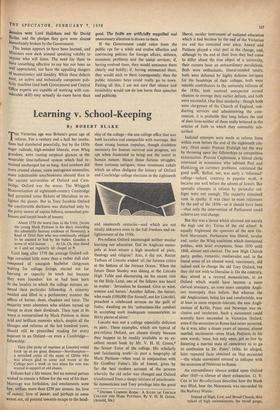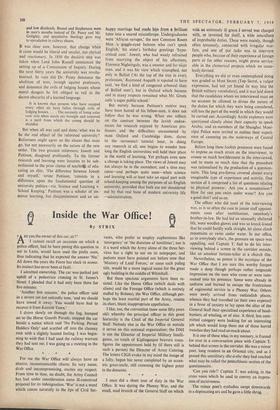Learning v. School-Keeping
By ROBERT BLAKE THE Victorian age was Britain's great age of reform. For a century and a half her institu- tions had slumbered peacefully, but by the 1830s eager radicals, high-minded liberals, even Whig grandees, were casting sceptical glances at the venerable time-hallowed system which had re- mained unchanged for so long. And nowhere did more crusted abuses, more outrageous anomalies, more indefensible anachronisms abound than in the ancient universities of Oxford and Cam- bridge. Oxford was the worse. The Whiggish Hanoverianism of eighteenth-century Cambridge had permitted some flickers of liberalism to en- lighten the gloom. But in Tory Jacobite Oxford the comfortable darkness was disturbed only by the porty snores of supine fellows, somnolent pro- fessors and torpid heads of houses.
About 1770 the worst time in the Univ. [wrote the young Mark Pattison in his diary recording the admittedly hearsay evidence of Newman]; a head of Oriel then who was continually obliged to he assisted to bed by his butler. Gaudies a scene of wild license. . . . At Ch. Ch. they dined at 3 and sat regularly till chapel at 9.
Until long after 1770 the average Oxford col- lege remained little more than a rather dull club composed of youngish bachelor clergymen waiting for college livings, elected not for learning or capacity to teach but because they were founders' kin or had been born in the locality to which the college statutes an- nexed their particular fellowship. A minority resided and filled in a perfunctory manner the offices of bursar, dean, chaplain and tutor. The majority were absentees who seldom turned up except to draw their dividends. Their type at its worst is immortalised by Mark Pattison in those acid and brilliant memoirs which, despite all the changes and reforms of the last hundred years, should still be prescribed reading for every aspirant to an Oxford—or even a Cambridge— fellowship : They [the party of reaction at Lincoln] could fetch up at no great distance—Northampton--a wretched cretin of the name of Gibbs who
was always glad to come and booze at the College port a week or two when his vote was wanted in support of old abuses.
Fellows had a life tenure, but no normal person Wished to remain a fellow for the rest of his days. Marriage was forbidden, and emoluments were low, seldom more than £250 per annum. So, love of money, love of power, and perhaps to some extent sex, all pointed towards escape to the head- ship of the college—the one college office that was both lucrative and compatible with marriage. But these strong human impulses, though doubtless necessary for human survival and progress, are apt when frustrated to bring out the worst in human nature. Hence those furious struggles, those tortuous intrigues, those venomous cabals which so often disfigure the history of Oxford and Cambridge college elections in the eighteenth and nineteenth centuries—and which are not totally unknown even in the full freedom and en- lightenment of the 1950s.
Pre-reform Oxford encouraged neither secular learning nor education. Did its Anglican mono- poly at least ensure a high standard of piety, theology and religion? Alas, it did not. Rector Tatham of Lincoln wished 'all the Jarman critics at the bottom of the Jarman Ocean.' When the future Dean Stanley was dining at the Lincoln High Table and discoursing on his recent visit to the Holy Land, one of the fellows was heard to mutter : 'Jerusalem be damned. Give us wine, women and horses.' Another fellow, the bursar, who made £100,000 (for himself, not for Lincoln), preached a celebrated sermon on the guilt of Judas, dwelling on his `unbusiness-like conduct in accepting such inadequate remuneration as thirty pieces of silver.'
Lincoln was not a college especially deficient in piety. These examples, which are typical of pre-reform Oxford, are chosen simply because they happen to be readily available in an ex- cellent recent book by Mr. V. H. H. Green,* the Senior Tutor of the college. His scholarly and fascinating work—in part a biography of Mark Pattison—when read in conjunction with Sir Geoffrey Faber's life of Jowett, gives by far the best modern account of the process whereby the old order was changed and Oxford transformed from a sleepy mixture of anachronis- tic monasticism and Tory privilege into the great w OXFORD COMMON Room : A STUDY OF LINCOLN COLLEGE AND MARK PATTISON. By V. H. H. Green. (Arnold, 30s) liberal, secular instrument of national education which it had become by the end of the Victorian era and has remained ever since. Jowett and Pattison played a vital part in the change, and, although by the end of their lives they had come to differ about the true object of a university, their careers have an extraordinary parallelism. Both were enthusiastic, liberal-minded tutors, both were defeated by highly dubious intrigues for the headships of their colleges, both were notable contributors to the university reforms of the 1850s, both received unexpected second chances to revenge their earlier defeats, and both were successful. One final similarity : though both were clergymen of the Church of England, con- ,ducting services and administering the com- munion, it is probable that long before the end of their lives neither of them really believed in the articles of faith to which they ostensibly sub- scribed.
Isolated attempts were made at reform from within even before the end of the eighteenth cen- tury. Oriel under Provost Eveleigh led the way by throwing open her fellowships to competitive examination. Provost Coplestone, a liberal cleric interested in economics who advised Peel and Huskissop, on currency problems, continued the good worc. Balliol, too, was early a 'reformed' college—indeed, contrary to popular myth, it became one well before the advent of Jowett. But sporadic attempts at reform by particular col- leges were not enough. The majority remained sunk in apathy. It was clear to most reformers by the end of the 1830s—or it should have been —that only the intervention of Parliament could achieve any real change.
But this was a threat which alarmed not merely the high and dry Tories of the old school. It equally frightened the sponsors of the new Ox- ford Movement. Parliament was liberal, secular and, under the Whig coalitions which dominated politics, with brief exceptions, from 1830 until 1868, almost anti-clerical. The new High Church party, gothic, romantic, mediaevalist and, in the literal sense of an abused word, reactionary, did indeed seek to change the old Tory Oxford, but they did not wish to liberalise it. On the contrary, they aimed at a revived monasticism, at an Oxford which would have become a mere clerical seminary, an even more complete Angli- can monopoly than before. But whereas the old Anglicanism, being lax and comfortable, was at least in some respects tolerant, the new Angli- canism of Keble, Pusey and Newman was ex- clusive and intolerant. Such a movement could scarcely have succeeded in Victorian Oxford, even if the secessions to Rome had never occurred. As it was, after a dozen years of intense, almost morbid, excitement—even Mark Pattison, in his own words, 'once, but only once, got so low by fostering a morbid state of conscience as to go to confession to Dr. Pusey' (who, he alleged, later repeated facts obtained on that occasion) —the whole movement seemed to collapse with the secession of Newman to Rome.
An extraordinary silence settled upon Oxford after 1845—a silence of sheer exhaustion. G. V. Cox in his Recollections describes how the blank was filled, how the Newmania was succeeded by the Railway Mania : Instead of High, Low, and Broad Church, they talked of high embankments, the broad gauge, and low dividends. Brunel and Stephenson were in men's mouths instead of Dr. Pusey and Mr. Golighty, and speculative theology gave way to speculation in railway shares.
it was clear now, however, that change when it came would be liberal and secular, not clerical and reactionary. In 1850 the decisive step was taken when Lord John Russell announced the setting up of .a Commission of Inquiry. During the next thirty years the university was revolu- tionised. In vain did Dr. Pusey denounce the abolition of tests, inveigh against professors, and denounce the evils of lodging houses whose moral dangers he felt obliged to . veil in the decent obscurity of a learned language.
It is known that persons who have escaped every other sin have fallen through evils of lodging houses. . . . The necessity of being solus cum sola when meals are brought and removed is a peril from which the young should be shielded.
But when all was said and done, what was to be the real object of the reformed university? Reformers might agree on the abuses that must go, but not necessarily on the nature of the new order. The two greatest reformers, Jowett and Pattison, disagreed profoundly. To the former research and learning were luxuries to be sub- ordinated to the prior claims of teaching of edu- cating an elite. 'The difference between Jowett and myself,' wrote Pattison, 'consists in a difference, upon the fundamental question of university politics—viz. Science and Learning v. School Keeping.' Pattison was a scholar of im- mense learning, but disappointment and an un- happy marriage had made him from a brilliant tutor into a soured misanthrope. Undergraduates were 'African savages,' the new Common Room Man 'a goggle-eyed baboon who can't speak English,' his sister's birthday greetings 'hypo- critical cant.' Jowett, who had wisely refrained from marrying the object of his affections, Florence Nightingale, was a sweeter and far nicer man, and it was his view which triumphed, not only in Balliol ('At the top of the tree in every profession,' Raymond Asquith is reputed to have said, 'we find a kind of congested arboreal slum of Balliol men'), but in Oxford which became and in many respects remained what Mr. Green calls 'a super public school.'
But merely because Pattison's motive may have been hatred of his fellow-men, it does not follow that he was wrong. When one reflects on the contrast between the lavish endow- ments for research enjoyed by American pro- fessors and the difficulties encountered by most Oxford and Cambridge dons, slaves to the sacrosanct tutorial hour, in doing any research at all, one begins to wonder how long the English universities will hold their place in the world of learning. Yet perhaps even now a change is taking place. The views of Jowett may not always be in the ascendant, and a time may come—and perhaps quite soon—when science and learning will at least take an equal part with school-keeping among the purposes of an English university, provided that both are not shouldered out by that real bane of modern university life —administration.



































 Previous page
Previous page